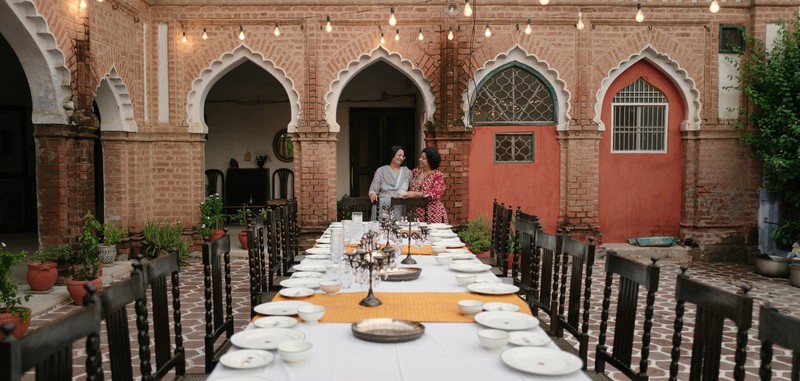
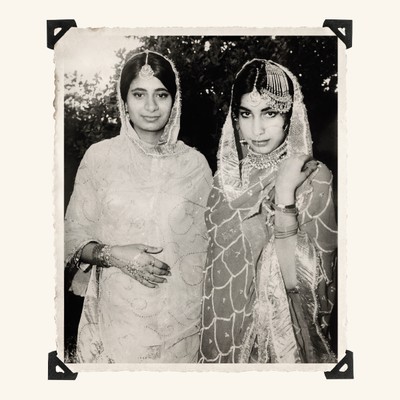
Chapters In My Life: Asma Khan
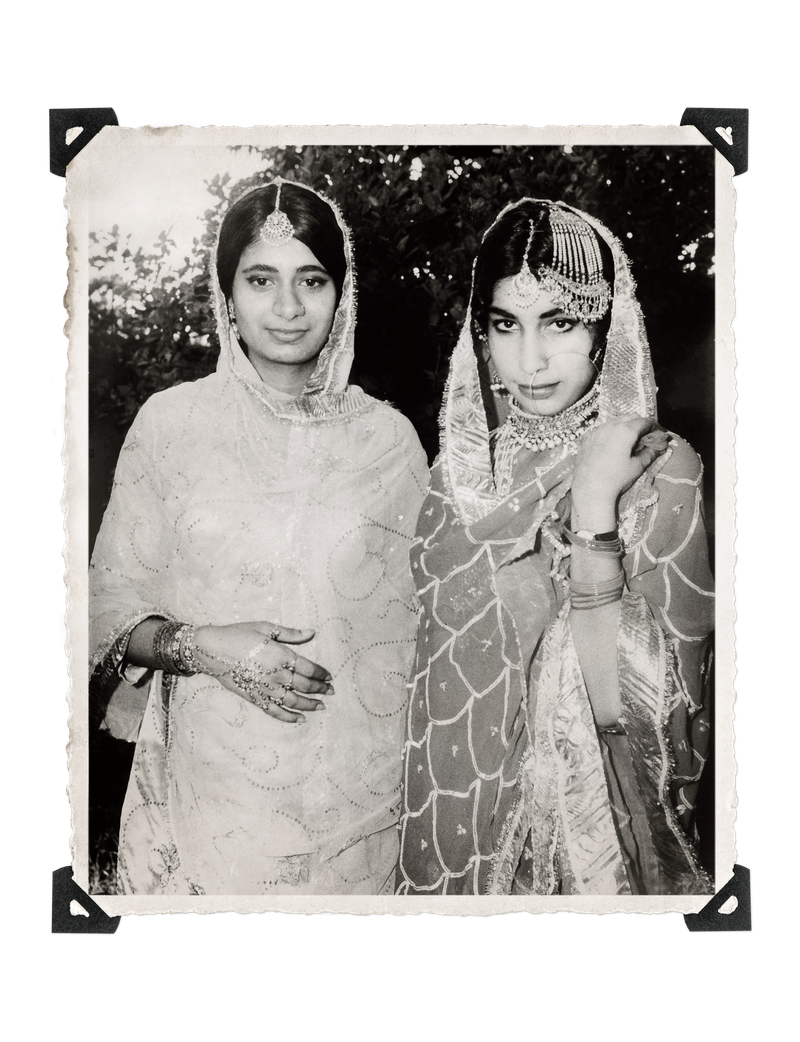
Chapter One: Growing Up In India
“I was very fortunate to grow up in a different kind of India. There were no mobile phones, no internet, and most Hollywood films were banned. It was a time of great innocence, because I spent most of my childhood years on the streets of Calcutta, playing cricket and spending time with my neighbours. It was a time of great joy – I had a very uncomplicated upbringing. Of course, when I grew a little older, I went to college and managed to find friends outside my own community. I worked as a journalist for a brief time before I got married, so I had work colleagues and friends. But meeting friends and going out for endless cups of tea in tea shops was really the only entertainment.
“I was born a second daughter. Because of society pressure, my mother was upset that I was a girl. But after the initial shock, both my parents treated me the same as my siblings. I think because they themselves had not been the favourite child, they were very conscious when they had three children that they should not discriminate. My sister was very different from me, and my brother is three years younger than me, and all three of us were treated exactly the same. They gave us the same things and the same rights, and I think that's probably why we were extremely close and are still very close now.
“Food was always extremely important and central to our family life. All socialising happened around a meal. I come from a very big family – inevitably someone was getting married or engaged or someone died – so there was always an occasion where relatives were turning up. It was a non-stop feasting situation in our house – even though it was a nuclear family, it felt like a clan because our house was the one place where everyone gathered. That was because the food in my house was really good – we were always entertaining visitors or people who were just passing through the city.”
Chapter Two: My Arranged Marriage
“All that changed in 1991 when I met my husband. It was an arranged marriage. My husband was completely innocent and had no idea there was this big arrangement set up for him. I knew what was happening, but he didn’t, and he reluctantly agreed to marry me – but it’s been 30 years now, and we’re still married! I was 21 and was just so excited and happy about getting married. The enormity of leaving home didn't quite sink in, because I went into crazy preparation mode for my wedding: organising all the food that my mother and relatives would be cooking and all my clothes – Indian weddings are not just one day, you need seven-days’ worth of outfits. And not just that – you get pulled into all the drama of all the outfits your aunts and cousins and siblings – and even distant relatives – will be wearing. It's a real circus, but great fun as well with lots of eating and singing all night, and cooking desserts ahead of the wedding. It was a wonderful time. The three months went by in an instant. One day I was preparing for my wedding and then, suddenly I found myself on a plane heading to strange land.”
Chapter Three: Moving To The UK
“I’d never been to the West in winter, so I presumed it would be just a little bit colder than July and August when I’d visited before. My goodness, it was not – it was freezing, I didn't have adequate winter clothes and I found the whole experience isolating. I felt very uprooted and disconnected, as I was trying to make friends and get to know my husband, who was often away with work. Again, there weren’t mobile phones or many opportunities to meet people. In Cambridge, if you're not a student or an academic, you're nobody. I applied to study law at Cambridge and was very happy when I was accepted. But, at the same time I was offered a place, my husband decided to take a new job in London. And because my first experience of England and Cambridge was so horrible, the idea he was going to leave me in alone Cambridge was too daunting, so I decided to move with him.”
Chapter Four: Learning To Cook
“While I was waiting to study, I went home a couple of times and learnt how to cook. One of the things that drove me, not just that I was very homesick and missing the food, was I thought this would be a good way to start making friends – if I could cook, I could invite people round for dinner and maybe they'd like me and be my friend. It was a difficult time – 30 years ago, you could say hello and talk to someone in the supermarket but then you might never see them again. I went to libraries and I tried to do the same, but the only way you could meet people again was if you actually arranged to meet in the library or a coffee shop in advance. I was persistent when it was hard to make friends, and I found the whole thing quite isolating, but when I started cooking I began to invite people home and then suddenly I had lots of friends.”
Chapter Five: Getting My Law Degree & PhD
“When we moved to London, I managed to get a place to study at King’s College London and I did my law degree there. At the end of my degree course, I had my first child, then I went on to do a PhD, and then had my second baby. It wasn’t until 2012 that I started thinking about creating a food business.”
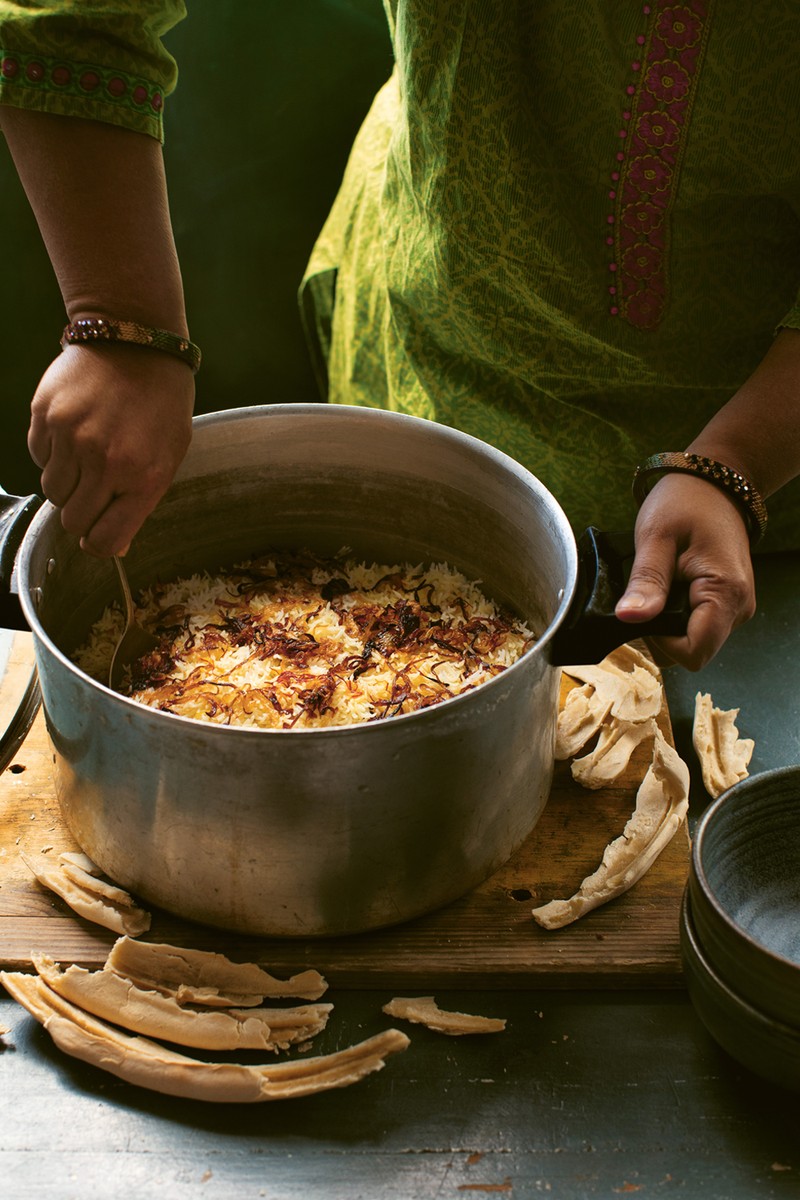
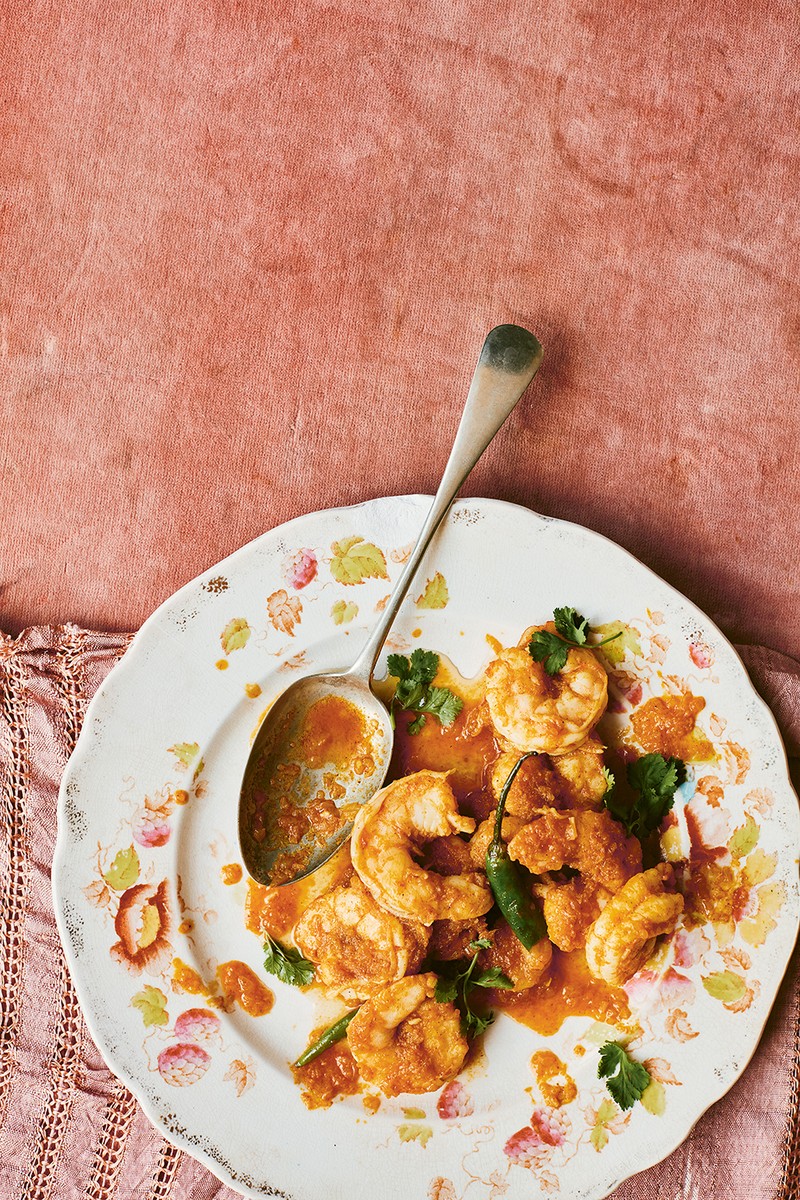
Chapter Five: Darjeeling Express Launches As A Supper Club
“When my PhD ended, I was absolutely one hundred percent sure I did not want to teach, and I didn't want to do research. So I decided to cook. Someone told me about supper clubs and I thought they sounded like a good idea. Rather than trying to have a conversation with my husband explaining what it was all about, I waited until he left for a trip to Africa and threw one when he was away and never told him. I did this for many, many months – every time he travelled – as it seemed pointless to have an argument over something when he wasn’t going to be there. That was my logic then. I now know it was wrong and I was actually lying to him, but he didn't need to know – I just forgot to tell him! Running the supper clubs made me feel very happy and I knew that no kind of case I would win in court or lecturing students or doing research would give me as much happiness as this was. Not the cooking but feeding people.
“Back in 2012 and 2013, you didn't see anyone like me in the food world in this country. Supper clubs were pretty much unknown, especially Indian supper clubs. Singaporean supper clubs were huge, there are lots of different versions of Chinese, Cantonese and Shanghai-style events, but it was still rare to have an Indian one. At the time, I didn't think that much – I just did things because I was having fun and that's how the business grew.
“I’ve always run an all-female kitchen and the pop-up was no different. When my children went to the primary school opposite my house, I met a group of women who were live-in nannies for European families. I realised they probably didn’t cook their own food in those houses. Sundays were their day off, and they didn’t really have anywhere to go, so they ended up coming to my house and helped me host the supper clubs over the weekends. Now, they’re part of the same team that is still with me today.”
Chapter Six: My Life-Changing Soho Pop-Up
“Starting the pop-up in The Sun & 13 Cantons was a big shock, but I had no choice because my children were very getting very upset at the disruption the supper club was causing at home. The events took place over the weekend and that was only time the children were home, so they’d be locked in one side of the house. They hated it and didn't want to come out and meet strangers at that age. There were always people in the dining room, in the kitchen, wandering around the house… my sons hated it. So I decided to find somewhere else.
“Moving into a very fancy pub in Soho was quite crazy. At the time you didn’t ever see Indian food in pubs – in fact, it was quite rare to have any kind of food, except for pie and mash and a few places serving Thai food. We were not successful in the beginning. We got a lot of push back from clients saying things like: ‘I don’t want your curry, love.’ They were very hostile. But that all changed when Fay Maschler wrote an amazing review in the Evening Standard. She happened to come in on her 70th birthday, loved the food and suddenly overnight the place was packed with people wanting to eat my food.”
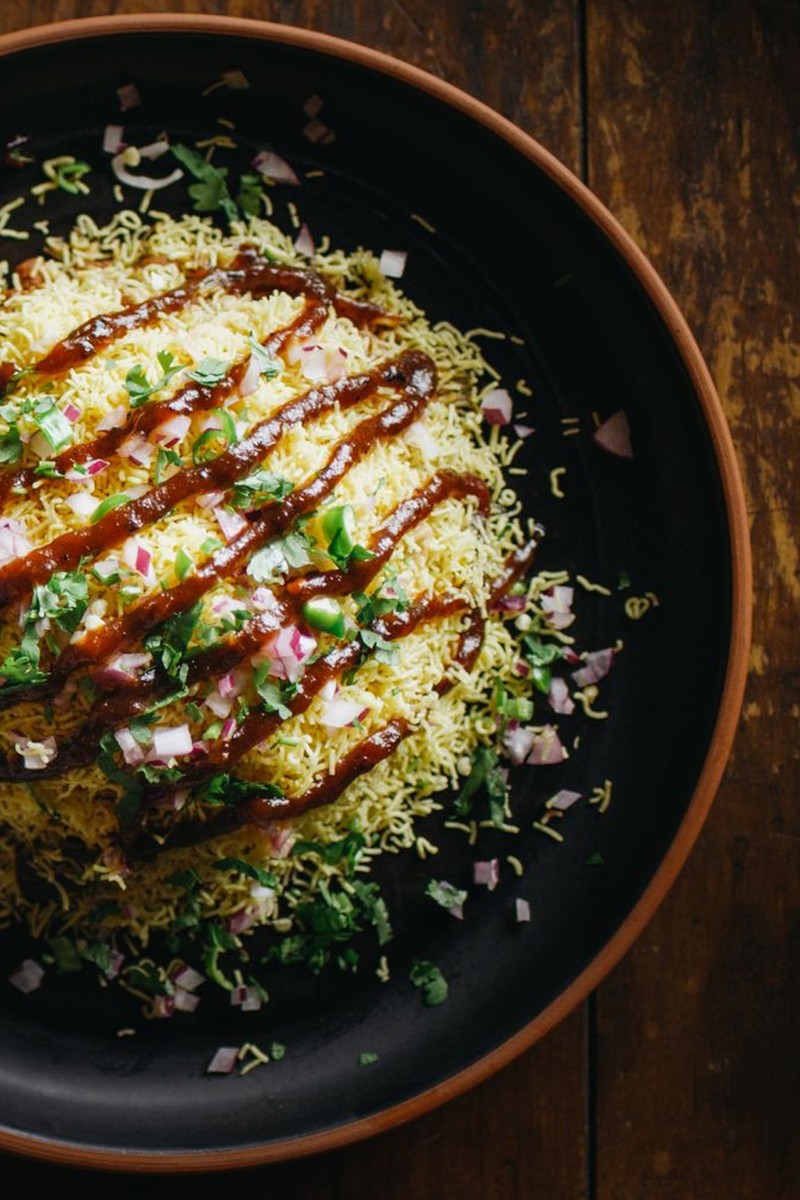
Chapter Seven: My First Restaurant
“I was not looking to open a restaurant at all. As the saying goes, you cannot be what you cannot see. There was no one else who looked like me in the restaurant world and I didn’t have a godfather, husband or father in the business. It’s like Bollywood: you need to have someone powerful backing you. I didn't think I'd get anywhere. But one of the regulars in the pub was a landlord at Kingly Court in Carnaby Street. He loved the food. One night, I told him I was leaving because my term was over, and he showed me Kingly Court. It has a different kind of rent structure to encourage pop-ups and young food businesses, which meant the second-floor business rates were very reasonable. And it was frighteningly, eye-wateringly scary, but it wasn’t impossible. So I started to pull together a business plan.
“It was a big success. But I’d be lying if I said there was some great plan. There wasn't. Perhaps that sounds like I didn’t have any vision but, honestly, I was just enjoying myself, I was cooking, I was making friends and I was having a good time. I didn’t have any kind of trajectory for where I was going. When I look back, I feel really lucky that the restaurant was a success, but it was completely unplanned. It just happened to me.
“That said, launching the restaurant was pretty tough because I felt intimidated. I felt I should get people onboard who were more experienced. And that's when I made my first mistake. I took on a GM who came with his entire team who had worked for him before. He lacked empathy and sympathy. He only worked for us for two months – I gave him notice and said his behaviour was unacceptable. His whole team went with him and I was left with just one member of staff. We got through it because the next day, everyone around Kingly Court queued up saying: ‘If we can have staff food, we’ll work for you for free.’ I didn't know how to open a wine bottle – I still don't! – so there's no way I could have run the bar. But other restaurant owners sent their people over to help us out. There was a great sense of community.
“That was the biggest challenge I faced. After that, there was nothing else and we managed to create a team. Like everyone, we made mistakes – some nights the service wasn’t up to scratch, and there was one week when the tills were down. It wasn't smooth sailing, but it was a learning curve. The most important thing was that people loved the food because the cooking was excellent. That is why the kitchen has got the status it has. The most important thing I’ve learned is not to compromise on your principles.”
Chapter Eight: Netflix Calls
“A few months after we launched the restaurant, we got the call from Netflix, and everything changed. I'd never seen an episode of Chef’s Table, so I didn't really know what to expect. I knew it was a huge thing, but I didn’t even have Netflix. Somebody came by with a laptop and showed me an episode and that's when I realised this was going to be fun. I was excited that my women would be seen on TV. They’d never been anywhere. I told the producers I’d only do it if they showed my women and gave their names. They told me no other chef had asked to show their team or sous chef, instead they asked to show their partner or investors. This is a 37-minute episode – you want to show your team, as without them I am nothing. The show was fabulous – it was unscripted, and they let me talk about whatever I wanted to.
“As part of the show, I went back to India. My parents nearly had a heart attack when they saw so many people: ‘Why didn’t you tell us, we’d have painted the house!’ was their reaction. After their initial shock, everything was smooth sailing. We had our challenges – it was monsoon season, cameras got flooded, we got stuck in mud – all kinds of things happened, but it was a great shoot and worked out really well.
“It does feel very special to be the first and only UK chef to have been on the show. I feel very privileged and it's a real honour. And I think it says something about the food scene in this country, because ethnic food is a very big part of the fabric of our food culture. The fact an Indian chef was selected for the first UK episode makes sense to me. I was so happy no one questioned my status as the first British chef and that says a lot about our community. People who love food are generally good people.”
Chapter Nine: The Pandemic
“We launched our new site in Covent Garden in 2020. We’ve been in and out of lockdowns, so it's been a bit of a rollercoaster ride, but the landlord has been helpful, kind and supportive. It’s a very big site and I only took one side of it – the rest of the building is not rented, and this obviously can’t continue forever, so I don't know how long I plan to stay on as I don't want to expand to two floors. My cuisine doesn't lend itself to mass cooking, it’s all cooked fresh which is only possible for a limited number of people. We might think of moving elsewhere – we might go back to my roots and return to the supper clubs.
“But the opportunity to be in such a huge space has been great for us. During the pandemic, it’s kept everybody in my entire team safe, as the kitchen is massive and we have showers, so everybody was able to travel in safely and were able to follow all the Covid rules, which would have been impossible in Kingly Court as the kitchen was tiny. It’s a great place to have seen us through Covid. But I don't know how long I plan to stay on here.”
The Next Chapter
“My new book is a dedication to my mother. It's called Ammu, which is what I call her, and it covers five decades of my life and my relationship with her and with food. It goes from childhood food and all the dishes I learnt to cook when I was in my 20s through to feasts and how to cook for children who might not eat the same things as you. The book has 100 recipes, but at any given time it has a recipe that will work at whatever stage of your life you’re in.
“My mother was always completely convinced that I would be something great in my life. She’s a typical Indian mother – she thinks I’m exactly where I should have been. In fact, I should be doing even better! I have changed perceptions. I have elderly aunts telling me I’ve brought honour to the family. These kinds of terms were never used for girls, especially not second daughters. Honour was something much more complicated. It does feel good, but I think this is just the beginning. I think that every family that has lots of girls should see my episode of Chef’s Table and see the Darjeeling Express story. Look at the women in the kitchen and understand that the limitations and prejudices are in your head. If you put those down and remove them, the world is your oyster – and you can do anything. I think it’s really important for people to understand that your kismet and destiny are not assigned from the moment you are born, just because you are a girl. Look at my story – I made my destiny different.”
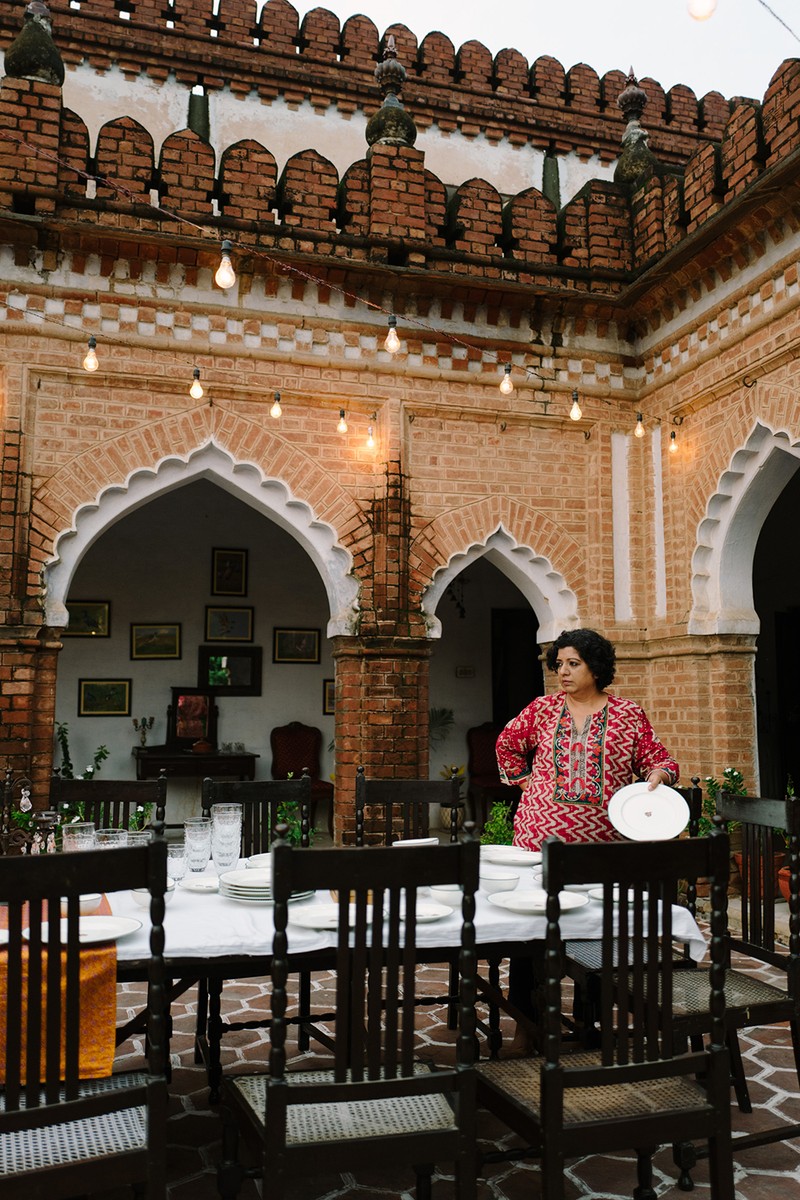
Ammu by Asma Khan is published on 17th March and can be pre-ordered here. Visit Darjeeling-Express.com
DISCLAIMER: We endeavour to always credit the correct original source of every image we use. If you think a credit may be incorrect, please contact us at info@sheerluxe.com.

